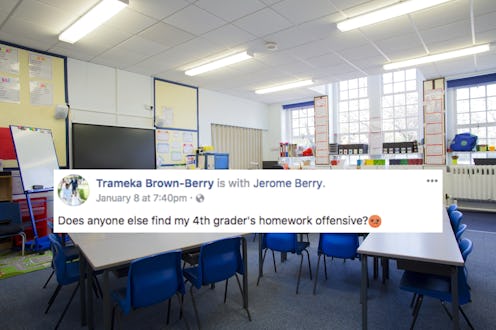Life
A Teacher Told Fourth Graders To List “Three ‘Good’ Reasons For Slavery” On Their Homework
At a Milwaukee-area school, a fourth grade teacher assigned students to write “three ‘good’ reasons for slavery” as homework, prompting a public reaction that’s been something along the lines of “...excuse me?” Trameka Brown-Berry, whose son attends the 3K-8 school, brought initial attention to the assignment in a post Facebook. Brown-Berry shared a photo of the assignment accompanied by the question, “Does anyone else find my 4th grader's homework offensive?” Neither Brown-Berry nor Our Redeemer Lutheran Church and School, the school where the homework was assigned, responded to immediate request for comment. In a statement shared with local news station WESH, a spokesperson for the school said:
“We understand that, as presented, the words used showed a lack of sensitivity and were offensive. The purpose of the assignment was not, in any way, to have students argue that any slavery is acceptable — a concept that goes against our core values and beliefs about the equality and worth of people of all races.”
The homework, which appears to be a group assignment, read, “Give 3 ‘good’ reasons for slavery and 3 bad reasons.” The quotes around “good,” though their exact intentions unclear, appear to be an attempt to acknowledge the trouble with arguing slavery was “good” in any capacity. However, without context, the quotes are doing a lot of heavy lifting.
Brown-Berry’s son responded to the question writing, “I feel there is no good reason for slavery, that's why I did not write.”
His “bad reasons” for slavery included splitting up family member, “biting them,” making other people do “your job” and punishing them. The fourth-grader’s final line of the assignment read, “I am proud to be black because we are strong and brave.”
Brown-Berry’s initial January 8 Facebook post has since been shared over 2,800 times and prompted community members to contact the school to express their concern. In a follow-up Facebook post, made just a day later, Brown-Berry shared five steps she suggested the school take to prevent incidents like this in the future, including “staff and teachers being trained in a cultural diversity/ cultural competency inservice to prevent this from happening again.”
Brown-Berry’s also shared that she’d been in contact with the school and changes were already being implemented. According to her post, the teacher has since apologized to students and the school is working to better train staff on cultural diversity. A report from WESH states the school has pulled the assignment from curriculum.
In 2015, five million Texas schools starting teaching slavery as a “side issue” in the Civil War. As the Washington Post reports, the new curriculum also did not mention Jim Crow laws or the Ku Klux Klan. Among the new guidelines’ critics was Republican Rod Paige, who served under President George W. Bush. “I’m of the view that the history of slavery and civil rights are dominant elements of our history and have shaped who we are today,” Paige said. “We may not like our history, but it’s history.”
Erasing slavery from history books does not make it go away. In turn, ignoring the significance of slavery in American history does nothing to address the ways in which it has shaped our country and the lasting effects it’s had on our social and political infrastructure. Understanding why people justified slavery is part of understanding how it happened in the first place. That does, however, require sensitivity. Using words like “good,” even in quotes, is arguably analogous to Trump’s “very fine people on both sides.” Addressing and acknowledging the bad requires denouncement of that bad, lest we start down a path of trying to humanizing those whose goal was to dehumanize others.
“The only way to teach our kids to stand up for their rights and respect is to model it,” Brown-Berry wrote in a post thanking people for their support in advocating for her son. “With all of your support I was able to give my child a personal life lesson about how change starts with you.”
